Bennington Community Market Now Open: A Hard-Won Victory for Health and Community
Bennington-area citizens have worked for years to make local produce available year-round in their downtown. Their success signals a renaissance fueled by the community supported enterprise concept.
At 11 am on March 9, more than 100 people descended on 239 Main Street in Bennington to attend the Bennington Community Market’s Grand Opening and Ribbon Cutting Ceremony. The atmosphere was exuberant and had every cause to be: this was the culmination of years of work to make fresh local produce and other groceries available conveniently and affordably downtown.
“This is such a happy, happy day,” said Shannon Barsotti, Community Development Director of the Town of Bennington. “All throughout the project, people have been so generous with their time. They have given generous donations to make this happen and have worked so hard.”
The Beginning
Citizens' surveys and discussions had revealed a real desire to have a downtown market, including fresh produce, for many years, Barsotti explained. In addition to the surveys, the Town of Bennington had been designated a "food desert," and it was clear that a downtown market was a priority. There were simply not enough convenient places to purchase fresh food downtown within walking distance for local residents.
In 2019, Bennington College and the Center for the Advancement of Public Action (CAPA) collaborated with local hospital Southern Vermont Medical Center, public school district Southwest Vermont Supervisory Union, and the non-profit Greater Bennington Interfaith Council Services and were awarded a grant from the Andrew W. Mellon Foundation called “Building a Community Curriculum: A Complex Systems Approach to Food Insecurity.”
With the grant, a group of town officials, local non-profits, food pantries, farmers, community leaders, business owners, and Bennington College faculty and staff convened to build on discussions about what was needed to address food insecurity locally. Bennington College students participated through classes and projects to explore the topics of food justice, food sovereignty, and food policy. They interacted with local farmers, distributors, international visitors, and the grant partners to uncover information that informed the plan for the market.
“And that was really the genesis of this project,” Barsotti said.
The working group eventually divided up into several different projects and some of the individuals went on to participate in the Bennington Community Market. They looked at models in other Vermont towns to save or restart their small local grocery stores. The Preservation Trust of Vermont calls these locally funded initiatives Community Supported Enterprises (CSE).
“Some of them are tiny little communities that have raised hundreds of thousands of dollars,” Barsotti explained. “If they can do that in Elmore, Vermont, we can do it in Bennington,” she remembers thinking as the project began.
The vision continued to expand. By adopting a broader social mission, the store would substantiate the market’s non-profit status. Not only would it be a grocery store stocked largely with locally grown, produced, or crafted items, it would promote sustainable local agriculture, revitalize downtown, increase access to healthy food for everyone, and provide job opportunities and community-building events.
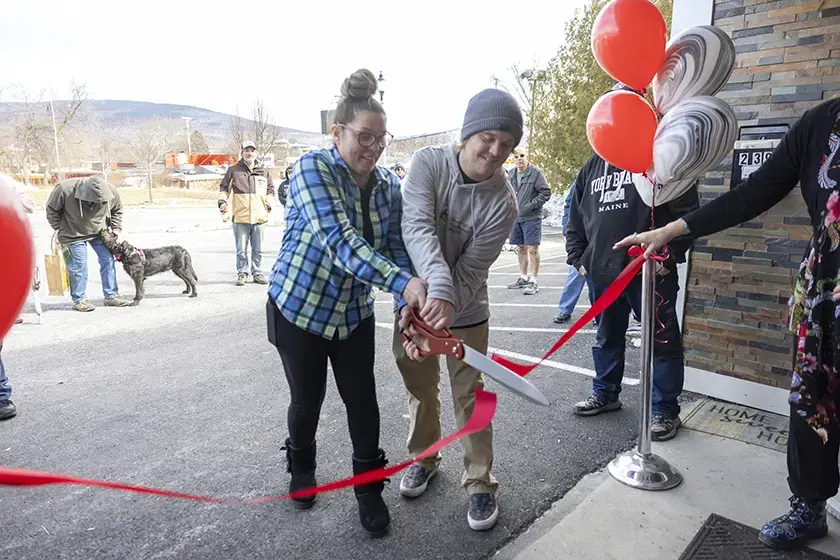
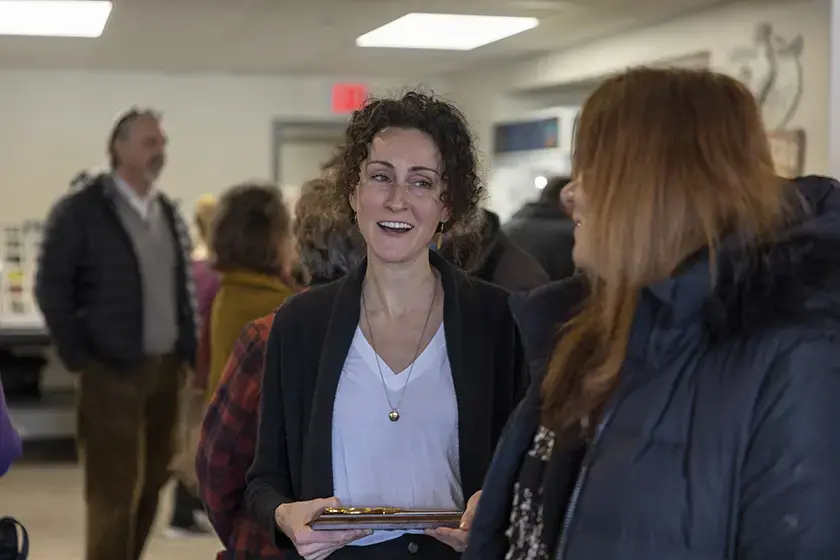
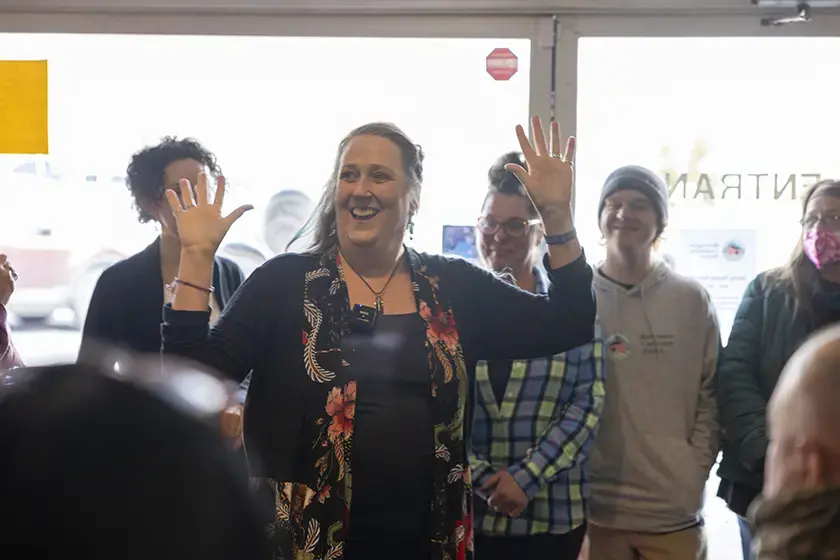
The Team
This was a big project. The challenges and uncertainties were enormous, according to Susan Sgorbati, a member of the market’s board and the Director of Bennington College’s Center for the Advancement of Public Action (CAPA). Finding space, hiring staff, and securing funding all happened with challenges and opportunities, she said.
“Whenever any one of us had lost their faith, another one would prop us up,” Sgorbati shared. “We are really lucky that we had a really strong team.”
Getting the funding, more than $500,000, was particularly challenging. The Town of Bennington provided a loan of $200,000 from the Bennington Revolving Loan Fund. With these funds secured, the market’s fundraising committee began to ask donors for funds in the early spring of 2022. They answered enthusiastically. Local donors contributed over $200,000.
The market also received economic development grants from the Citizens for Greater Bennington, The Vermont Community Foundation, and the State of Vermont’s Building Communities program. The organization continues to welcome members at a rate of $50 and to collect tax deductible donations. Fifteen percent of all membership funds go towards the market’s Fresh Food Access Fund.
The building work came with its own challenges. The initial plans indicated opening in late spring 2022, but the COVID pandemic derailed supply chains and increased costs. The team waited for parts for the used kitchen equipment they had purchased.
“There were bumps along the road getting the space ready,” said Aila West, Chair of the market board and Associate Director of the Prison Education Initiative at Bennington College. (Amid the noise of the crowd at the opening celebration, West’s answers took on the vibe of a post-game sideline interview with the captain of the winning team.) “But we persevered, and here we are.”
All of the leaders were quick to thank the many board members and key players, who kept the vision alive when the chips were down.
In addition to Market Manager Diana Shepherd, who was lauded for her steadfast loyalty to the mission and who immediately shared credit with Assistant Manager Riley Flynn, leaders speaking at the opening event mentioned Meg Campbell of Preservation Trust of Vermont; Sheela Harden of Bennington Potters; Bruce Carpenter, the general contractor; and Bennington alum Ahmad Yassir ’20, who handled the organization’s media and promotions.
The Market
Bennington Community Market is open 8 am - 7 pm daily. Customers can browse shelves and coolers stocked with local produce. This time of year, there are local greens, potatoes, and onions along with strategic items from afar.
“In spring, summer, and fall, we will be able to bring in more local produce,” said Shepherd. “I wanted to be sure that we had [local] products but also essential items that you need… a lemon, a lime, or a banana.”
It’s easy to find locally crafted food, too, like jams, honey and maple syrup. Pownal-made Gammelgården Creamery Skyr shares a cooler with Cabot cheddar. Customers can pick up a bag of pretzels or chips with a container of Boar’s Head Hummus. Vermont-made Aqua ViTea Kombucha is on tap.
Visitors can enjoy coffee at one of the large wooden tables. Free wi-fi, charging stations, and big windows with a view of Bennington’s iconic White Rocks make the market a place customers can hang out, work remotely, or socialize.
At the back, a kitchen pumps out an original menu of freshly prepared foods every day. (“My chefs are artists,” Shepherd promises.) On a recent day, the menu included burritos and quesadillas, a potato bar, stuffed peppers, and a build-your-own bowl featuring a range of proteins, starches, and vegetables. Cold prepared food and fresh ingredients are stocked in the coolers.
At the opening event, the same people often found mingling at Chamber of Commerce mixers joined citizens and shoppers to create a shoulder-to-shoulder crowd. Purveyors handed out samples of the store’s products for guests to try, including skyr, cheese and pepperoni, apple cider, and tortilla chips.
“The thing that we really want to see is that it’s a community market: not just for one group of people, but welcoming to all the residents of Bennington County,” said Sgorbati. “Yes, it will be a market where you can come and buy healthy food from our local producers and farmers, but also a place to engage with each other with educational and entertaining events for diverse audiences. I have already met so many new people just dropping in the market to get a cup of coffee.”
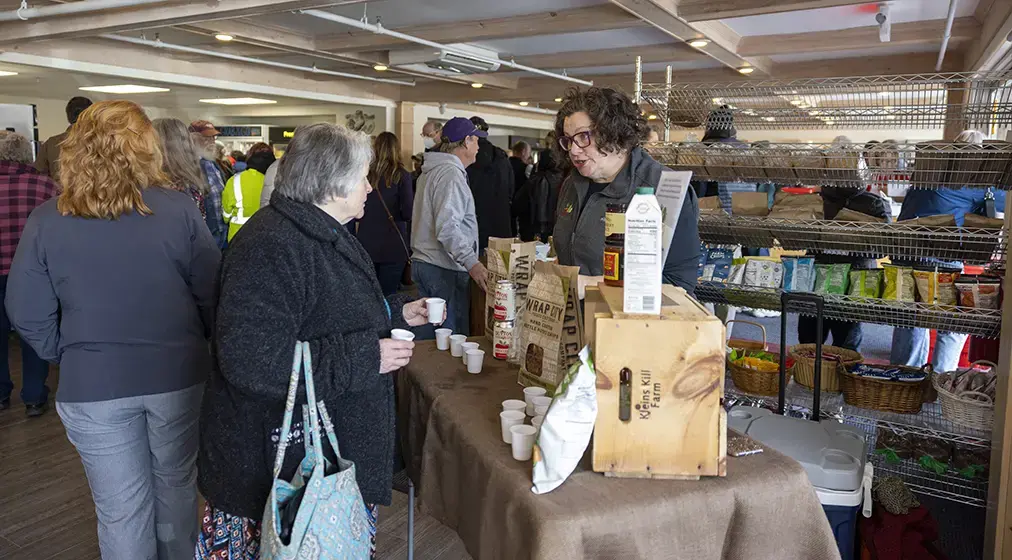
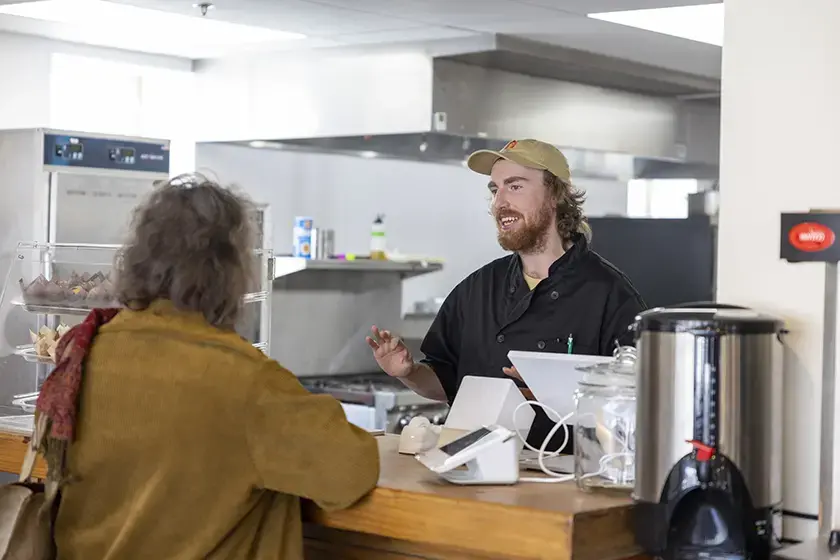
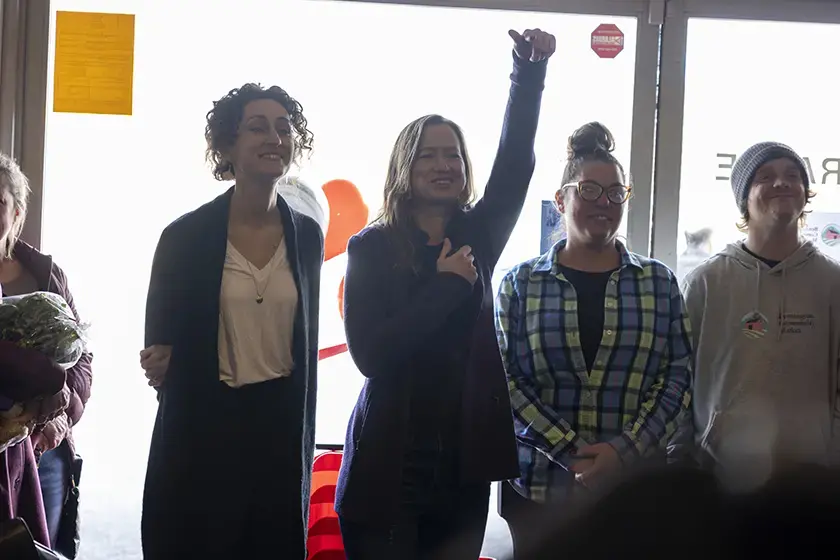
The Impact
Different community members at the opening focused on different benefits.
“I am really excited to have this market on this side of town,” said Lynn Greene, a local resident who lives on the south side of Bennington and who came to the opening. “It’s a haul to go all the way to Northside Drive [for groceries]. It is going to be our little city market.”
Many people noted the positive environmental impact of having a store within a shorter driving distance or even walking distance for many more people. Others noted the carbon saved by stocking primarily local produce, rather than food that travels across the country or the world.
Sally Dodge, who raised grass-fed beef in Pownal until 1986, sits on the market board and is most interested in the durability of the food system.
“What’s really important about this is how it adds to our food resilience,” she said. “Just think, during COVID, the grocery stores were empty, but people could go to our local farms. As we get deeper and deeper into the problems of climate change, local food is going to be key.”
Store manager Shepherd is excited by the opportunity to provide food to people of all socioeconomic backgrounds. She pointed out the store’s acceptance of the Supplemental Nutrition Assistance Program (SNAP). They also have a Fresh Food Access Fund.
“We have gift cards for families to come and shop and eat this food,” Shepherd explains. “It’s healthy food accessible to anybody.” She adds, “I look forward to feeding Bennington.”
For others, it’s mostly about community.
“Seeing the space filled with people but also the shelves and tables… It’s being able to feel the community vibe we were going for,” said Board Chair West. Looking around, she said, “Yes. This is what we were hoping for.”
The Future
The market board and staff members look forward to stocking more fruits and vegetables from area farms as the growing season kicks into full gear.
“We are expecting an exponential increase in the local produce we are able to provide in the next 6 months,” said West. “So that is going to shift what the grocery side looks like in the short term.”
But that’s not all. They have plans to offer educational and social events, like cooking classes, holiday pop-ups for vendors, guest chef presentations, wine tastings, and more. They also hope to provide workforce development opportunities and internships for area students and to further expand food access activities.
The team is especially excited about a new influx of funds to develop a space at the back of the building. A federal spending bill recently approved by Congress earmarks more than $2 million for Bennington’s Fair Food Initiative. It’s described in a press release from U.S. Rep. Peter Welch’s office as an effort to build “an inclusive, fair food system for all.” They are dreaming of a food processing facility, business incubator, local food aggregator, and community kitchen.
Barsotti is dreaming of more Community Supported Enterprises in Bennington.
“Just down the road from the market, in the Benmont Mill, is the Bennington Bike Hub, another wonderful new community nonprofit,” she said. “We could also use an outdoor outfitter, hiking and trail guides, a teen center, a hardware store that would offer household needs and farm supplies, locally made crafts. Lots of ideas. What people want.”
“I think the message is,” said Barsotti, “we can do hard things in Bennington, and we are going to do more.”